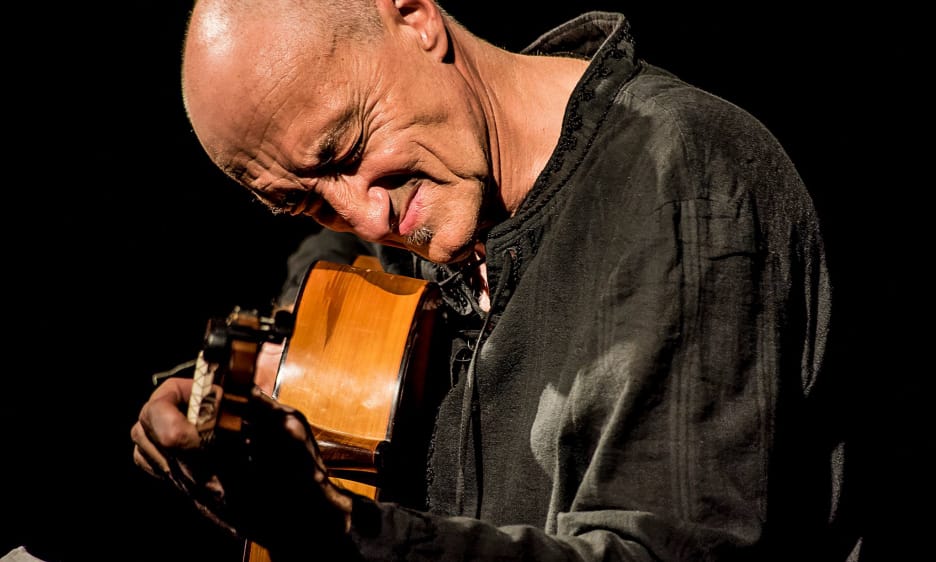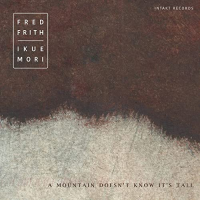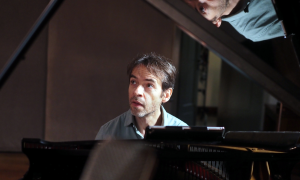Home » Jazz Articles » Interview » Miroslav Tadić: Macedonian Soul
Miroslav Tadić: Macedonian Soul

Courtesy Massimo Lesina
I think musicians who are successful artists are the ones whose music is a reflection of who they are.
—Miroslav Tadić
In pursuit of his dream, Miroslav Tadić came to the US in 1979. Macedonian music became the bridge betweenTadić and his roots. Infusing influences from jazz, rock, avant-garde music, and other musical traditions with eastern European folkloric music, his versatile improvisation approach has introduced countless musicians and listeners alike to the fascination of Macedonia.
In the past 38 years, the virtuoso guitarist has devoted his time to teaching at California Institute of the Arts. Having graduated from the same school at the age of 25, Tadić started to co-build the guitar program with his teacher, Stuart Fox. During his course at CalArts, Tadić encountered percussionist Mark Nauseef, who turned out to be crucial in his music career.
Our conversation started with Tadić's collaboration with violinist Yvette Cornelia Holzwarth on the making of Luka (Croatia Records, 2021), which brought us to the heart of the matter.
All About Jazz: Tell me about Luka. What's the inspiration behind the album?
Miroslav Tadić: "Luka," which is in the Serbian and Croatian languages of where I came from, means "harbor." It is with a violinist (Yvette Holzwarth), who is also very close to me personally. It's symbolic of our place of comfort. The music we're playing on this release is from eastern Europe, the area I came from. Yvette and I met because she was interested in studying that music with me. It naturally became the repertoire for our first album.
Luka is an instrumental album. A lot of the pieces are based on songs. We always remember the lyrics. It's the kind of emotions you keep when you're playing. I'd like to think of our music as a soundtrack for everybody's personal story in terms of storytelling. We don't want to limit people with a title necessarily. It's like cinematic music—music for an imaginary film.
We used to start with a faster piece with energy and excitement. Then we thought, and also some friends suggested it'd be better to start with something slow and meditative to bring people into a different flow of time. It's like coming to a harbor; the sea was ruffling before. Everything is finally quiet; the waves have subsided. Then you feel it's good to be on solid ground. In the end, we thought it was good to start with something with that feeling before we start running around.
AAJ: Let's talk about "Happy 13" and "Vuprem Oči"
MT: "Happy 13" is the first tune that was released. First of all, it's an interesting piece to musicians because it's in the meter of 13/8. Thirteen is very rare, and it sounds complicated, but it's very natural in Balkan music because people dance to it. Another thing about the piece is that it has an uplifting and happy sound. Personally, I find it very difficult for me to write happy music that doesn't sound silly. It's easy for me to write melancholy music, so this sort of happy and light quality attracted me. I made an arrangement with the folkloric melody, and then I decided I would like to write a piece that can be played by classical musicians, not only by people who know how to improvise. In order for that to happen, I had to write everything and every single note. I remember making a loop of ostinato. I sat down and improvised, then I recorded myself. I transcribed the parts I really like and wrote them into a permanent score.
Yvette and I both enjoyed playing it. We like that it can be played either by classically trained musicians or people who are more interested in improvised music and folkloric music. It's one of the pieces with influences from African and Brazilian music, and definitely from east European music and maybe from some composers like Bartok and Stravinsky, who were also using material from that area of the world.
Then we have the last piece of the album, "Vuprem Oči," which means I direct my eyes to the stars. It's a beautiful song about love and life—when a person is just standing and looking at the sky full of stars, you feel the universe is so big, and you're so small. This is from the northern part of Croatia. It is written in the pentatonic scale, so it has some connotations with African music and blues, and even with Asian music. Yvette is half Chinese. She also plays Guzheng. She's familiar with Chinese music. We wanted to bring those influences in but not to be superficial with them.
When we were playing, we were imagining this sky full of stars. That's why we play a lot of harmonics in the piece. It has a lot of reverbs and a very spacious sound. Then it goes into a beautiful, melancholy melody. We really enjoyed recording that, and we decided just to play it very openly. It's the opposite of "Happy 13."
"Happy 13" is a classical piece, we actually had to play everything written, but with "Vuprem Oči," we played without even talking about it too much. We played for about 10-15 minutes, then we listened to the recording, did some editing and condensed it to the final piece. That's an example of improvisation and free-form approach.
AAJ: How do you incorporate improvisation into this sort of music?
MT: Personally, it is one of the most interesting aspects of music—the combination of written music and improvised parts. If you think about jazz, there's always a written part, and musicians improvise over the harmonies and the melody ideas. We take a similar approach. It's just that we're not using jazz vocabulary. We'll take a traditional piece, which are usually short and simple, and then we use the material to improvise. Sometimes we will bring in certain influences, like something bluesy, then we start improvising. We always try to keep the balance between the source music and our influence.
On Luka, you can hear influences from flamenco and Spanish music because they are very close to me; influences from American folk music, which is really close to Yvette. You can hear jazz influences when we're playing over changes, and blues, which is also intertwined with the Americana sound. Some influences also from Brazilian music, which I play a lot, and from African Music because I really like it being rhythmic, repetitive, and hypnotic but is always changing a little bit. I've used some of those influences in the arrangements.
AAJ: Would you say music influences are more spontaneous, natural, and spiritual in your playing?
MT: I think it's all of those things. It's spontaneous in a way that we never think we're going to make a jazz or reggae arrangement. We're both interested in using influences, but in a more subtle and deeper way instead of being superficial like we're going to use this scale that makes it sound like Chinese music or Indian music. I don't really like that. It's like building influences inside the piece without it being too aggressive. That's why there is always more than one influence, and they come in spontaneously.
Another thing is, you have two people who are very close on a human level. Our communication as humans, not just musicians, is also something that comes through music. We can rely on communication that comes from not only playing together but from spending time, cooking, and dealing with other life problems together. I think this brings a very special quality to the music.
AAJ: What role does Macedonian influence play in Luka?
MT: Most of the pieces are coming from that region. It's not a very famous place. The reason why I feel so close to Macedonian music is that I grew up in a country that doesn't exist anymore. It's called Yugoslavia, and it was made out of six smaller states. Macedonia was one of them. I grew up in another state called Serbia, which is about a hundred miles north of Macedonia. When I was a teenager, I wasn't listening to folkloric music. I was listening to jazz, rock, prog rock, and classical music. The only type of folk music I was interested in was this music from Macedonia.
Macedonian music has a very wide range of emotions. Some of them are wild; some of them have sad feelings, and some of them have a very deep sense of joy. It's music with many different influences over the centuries: from the Byzantine empire to 500 years of the Turkish/Ottoman Empire to the migration of the Romany people, who brought music from India and Persia and are still living in Macedonia. In the 20th century, western music and harmony came in there through radio. It's a really interesting combination of influences. I always felt close to that music, so when I came to America to study music at CalArts, I started playing it more. It gave me a sense of identity. My friends started to know me by playing that music. I think it's important to connect to your roots, especially when you're not living in your own country.
Coming to the United States, the idea used to be anybody who comes is welcomed. It is not the idea that has been promoted by politicians recently, but it is the idea of America that I understand—the land of immigrants. You need to have respect for other people and other cultures, but at the same time, have a connection to your own. Music is a powerful way to stay connected to your culture. For me, that was Macedonian music. It gave me a certain identity and uniqueness. It was just a natural process of building my musical identity around that music.
AAJ: When you bring back Macedonian music into the region, what is the reaction?
MT: It's very moving. I was not born in Macedonia, but I've studied that music, and I have a lot of love and respect for it. People from Macedonia recognized that and have a great appreciation for it. I'm living in America, and I'm teaching young people Macedonian music. Many of my students, who are Americans and people living in other parts of the world, are interested in that music. Their music [Macedonian music] is becoming known through me in a certain way. They have a lot of respect and appreciation for it.
As a matter of fact, before Covid restrictions, Yvette and I were there, and we played at some big festivals. We had great receptions among other events, and it was kind of amazing. We played a big concert for the president of Macedonia, who was sitting in the first row. When you do something with real love and understanding, they appreciate it.
AAJ: With each person, you worked with. It brings out a different aspect of you. What aspect do you think Yvette Holzwarth has brought out in you, in comparison to Vlatko Stefanovski?
MT: It's a different kind of energy. It's interesting to speak about the idea of male energy and female energy. With Vlatko, he has a certain type of drive. He's competitive, but we're never competitive between each other. With Yvette, I feel like I can be completely who I am. It feels natural for me to play with Vlatko as well, but it indeed brings different things. By nature, I'm not very competitive. I don't like to show off or to be flashy. He [Vlatko] is very virtuoso, and he has that kind of drive, so he brings out a little bit of that from me. With Yvette, there's a lot of energy and dynamism, of course, but it feels more subtle.
The important thing in music and life is to feel comfortable with who you are. There are things you can do, and there are things you can't do. Let's say if I'm a guitarist who can play beautiful chords but can't play very fast, I'd like to feel my contribution can be that, so I don't have to try to do something I don't do very well. I collaborated with a lot of people. I think people I choose to work with are those with whom I can feel comfortable being myself. It's the same thing when somebody chooses me to collaborate with. They choose me because of who I am, not who they want me to be.
AAJ: What were the most influential experiences in your development?
MT: I would say the most important thing in my development was that people who were better than me still wanted to play with me. I spent many years playing with musicians who are much better than me. It's great, but I didn't feel uncomfortable around them. I was serious about it, and they recognized it. I was in the company of people without having to have a lesson. I learned the most just by being with them, listening to music together, and playing with those who are pulling me forward. That's why I like CalArts as a school because teachers play a lot with the students. When I'm playing with a student, I just feel like we're two musicians playing together. That was the main thing.
Then I met a close friend of mine, Mark Nauseef. He's a drummer. He came to study at CalArts when he was already a very highly developed musician. He was interested because CalArts is a unique school, and he wanted to study African music, Indian music, the Gamelan, and contemporary percussion music. He is one of the people who were much better than me. We became friends, and we started playing together. He's the person who introduced me to some other musicians and brought me to Europe, where I made my first record. We had a band together called Dark, in which I was playing electric guitar. We had another band called Bracha, where I was playing acoustic guitar. I was starting to record and develop both acoustic and electric playing at the same time. Those are very important initial experiences.
Once it started rolling, things happened naturally. One thing leads to another. That's why I like to tell my students who want to have everything planned out: it's not how it works. You can have a plan, but you also need to have faith that things are going to work out. I know it sounds like a motivational speech, but that's really how it works. Life leads you on a path, and you just need to be open to things and make good choices that are given to you. That's how it worked out for me. I consider myself very lucky, and I'm very happy about it, but I also feel like it's natural progress, and people should have some belief in it.
AAJ: You've been teaching at CalArts for 35 years. How has that experience been for you?
MT: First, I was a student. When I came to CalArts, like most students, I came with one idea, and I came out of it with a completely different one. I was interested in playing music that would be composed for me and for that instrument. During my course at CalArts, I started to be much more interested in improvised music and in using folkloric music as an inspiration to arrange and write my own music. I ended up finishing my studies with a group, Bracha, that I made my first record with in 1987. It was an international group of people from different influences. We were playing music with a lot of improvisation based on eastern European folk music and Indian music. It was a very organic process.
Then I started teaching because some people requested to study with me after I graduated. I started with a few lessons that I was teaching in the beginning. With my teacher, Stuart Fox, we started building a bigger and bigger guitar department. Then CalArts brought in jazz studies, and it started growing slowly. Between us, we had people covering everything from classical music to jazz to alternative and hybrid styles. It has been a great experience teaching at CalArts, working with individuals of different interests and needs.
It's interesting to think that I started teaching when I was 25 years old. I think for teaching, you need to have a certain amount of life experience to be able to deal with people of different ages, backgrounds, and cultures. Somehow, I managed to get through those years where you gain experience.
Just today, I was in touch with one of my students who graduated in 1991. It's crazy to think about it. We just talked about all kinds of things. It's a really nice feeling. You make important contact with a very important part of their life. Life experience is needed because you also need to help people with things that are not only musical. You need to be somebody who can offer at least one good point of view.
AAJ: What's your teaching approach?
MT: The essence of my teaching approach is to find out what my students really want to do and learn. It's actually not that easy because people don't always know what that is. Sometimes it's forming as it's happening. My approach is not to have a plan in advance but to be flexible with my students depending on where they are when they start to study with me and then see how that moves and develops. The idea of individuality is that we can't look at people in any other way from the standpoint of age, background, or race. You don't have any preconception of that person. You want to see who they are and what they're trying to do, so you can help them do that.
AAJ: What wisdom would you like to share with the younger generation?
MT: This idea of having a goal-oriented thinking is very common. I definitely don't want to say setting a goal is a bad thing, but you always need to have a flexible mind about it because as you're growing and developing as a person, your goal cannot stay the same.
People set goals arbitrarily, and they feel frustrated when they can't meet the goal, but it isn't as important as the process. Some goals you'll reach sooner than you thought, and some you'll reach later. You need to understand yourself and adjust your goal as opposed to being angry and frustrated at yourself that you can't do it.
Another thing I found is people think when they reach a certain level, things are going to be perfect. However, the fact is, even when you reach that level, there's going to be another level. Even more important than that, you are already at the level that you wanted to reach before. I've seen a lot of people who are unhappy with where they are. They were only unhappy because they thought they should be in some other place, but the place where you are is good, and you're moving forward to the next place.
AAJ: How would you describe the relationship between knowing yourself and playing music?
MT: Playing music is just one aspect of life. The more you know about yourself, the better musician you are going to be. The idea of understanding yourself reflects in everything that you do. It also reflects in your music. I think musicians who are successful artists are the ones whose music is a reflection of who they are— accepting your weaknesses, understanding your strengths, and working on yourself to be a better person, at the same time being understanding of yourself, finding exactly where you are, and remembering that it always changes.
AAJ: What would you say about music being a reflection of you at different stages?
MT: I've made more than 30 records where I was one of the lead artists. The first one was recorded in 1986. When I listen to them, I feel very lucky and happy about them, but it is like listening to somebody else. For me, it's a reflection of my life at a different point, and I can hear I did the best I could at that point of my life. There's a sense of finished work. You have to have respect for your earlier work. I always tell my students, "don't destroy your work, just keep it and look at it six months later" because it's a part of yourself that you may not understand at that moment, but you'll understand at a later point.
Tags
Interview
Miroslav Tadic
Katrina Yang
United States
California
Los Angeles
Mark Nauseef
Yvette Holzwarth
Vlatko Stefanovski
Bracha
Stuart Fox
California Institute Of The Arts
PREVIOUS / NEXT
Support All About Jazz
 All About Jazz has been a pillar of jazz since 1995, championing it as an art form and, more importantly, supporting the musicians who make it. Our enduring commitment has made "AAJ" one of the most culturally important websites of its kind, read by hundreds of thousands of fans, musicians and industry figures every month.
All About Jazz has been a pillar of jazz since 1995, championing it as an art form and, more importantly, supporting the musicians who make it. Our enduring commitment has made "AAJ" one of the most culturally important websites of its kind, read by hundreds of thousands of fans, musicians and industry figures every month.























